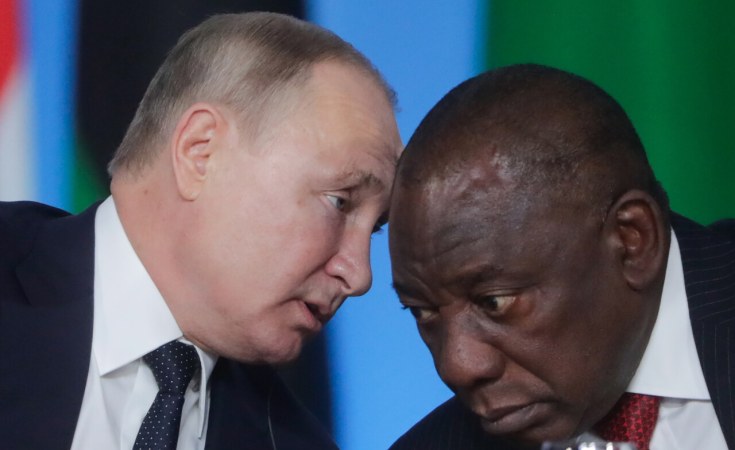International pressure on South Africa has eased now that the Russian leader will attend the BRICS summit via video link only. The decision leaves ties between the only African nation in the alliance and Russia intact.
South Africa's foreign policy dilemma is gone now that Russian President Vladimir Putin will no longer attend the August 22-24 BRICS summit in Johannesburg.
There had been wide speculation over possible consequences for South Africa if Putin were to jet in for the summit. The Hague-based International Criminal Court accused Russian President Putin of responsibility for war crimes committed in Ukraine
The International Criminal Court (ICC) has an arrest warrant out for Putin, over responsibility for war crimes committed by Russian forces in the Ukraine war .
Ramaphosa had feared war with Russia
Russian Foreign Minister Sergei Lavrov will travel to South Africa for the summit.
South Africa is a signatory to the Rome Statute under which the ICC began its work in 2002 and issued the warrant for Putin's arrest in March. South Africa would have had to arrest him if he turned up for the BRICS summit.
South Africa's President Cyril Ramaphosa had asked the ICC for an exemption on the grounds that imposing dentention could endanger "security, peace and order of the state."
Ramaphosa also told the court: "It would be inconsistent with our constitution to risk war with Russia."
South Africa and Russia are close allies.
Having Putin in South Africa would have put the country in a difficult position, says Cape Town-based political analyst Daniel Silke.
"There would have been the possibility of complying with the International Criminal Court's arrest warrant, and that would have embarrassed South Africa," Silke told DW. "Considering the fact that there is a strong bond between the two countries, it was decided from the Russian side not to strain relations that are important for Moscow."
According to Ramaphosa, the decision was mutual.
Putin would have disrupted BRICS agenda
South Africa's strong ties with Russia date back to the apartheid years when the now ruling African National Congress (ANC) was a apartheid-era liberation movement supported by the Soviet Union.
South Africa sees itself as neutral when it comes to Russia's war in Ukraine and plays a lead role in Africa's mediation efforts.
South Africa's main opposition Democratic Alliance (DA) had been pressing the Ramaphosa government to comply with the ICC and arrest Putin upon entry into the country.
However, according to Silke, it was always unlikely that Putin would actually attend the BRICS summit in person.
Having him present would overshadow the agenda of the emerging economies, which Silke says, also involves finding ways to counterbalance the influence of the West.
"And that's what Russia and China want," Silke told DW. "That's the key to the eventual agreement that was reached."
South Africa risked Western 'wrath'
International pressure, and the ICC warrant has prevented Putin from venturing beyond Moscow: "It has restricted his freedom of movement, and no doubt this will restrict his freedom of movement in many other parts of the world," Silke said.
Political economist Ronak Golpaldas told Reuters news agency that South Africa can now maintain its position as a government that respects the rule of law. The law, he added, is unequivocal about the country's domestic and international obligations.
"They should have arrested Putin when he arrived. Had that not happened, Pretoria would have been in a lot of trouble -- not only in terms of the rule of law, but also in terms of the reaction of the business community and the international community," Golpaldas said.
The impact on financial markets would likely have been profound, experts say. The South African rand is already severely weakened in the face of a struggling economy and an unprecedented and protracted energy crisis.
Doudou Sidibe, a professor of international relations at Gustave Eiffel University in Paris, says that if South Africa had refused to arrest Putin, it would have incurred "the wrath or criticism of Western countries."
Vincent Niebede contributed to this report.
Edited by Benita van Eyssen


